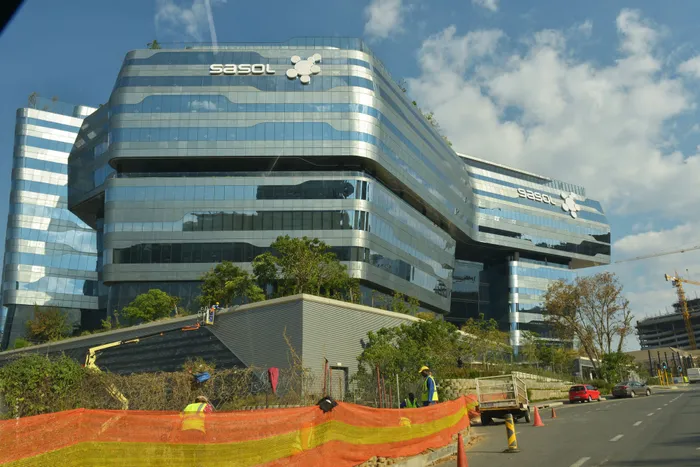Sasol extends gas production timeline to support South Africa's LNG transition
Industrial

Saso office, in Sandton. The fuels and chemicals group has maintained its greenhouse gas emissions reduction target of 30% by 2030.
Image: Karen Sandison/Independent Newspapers
Sasol, a leader in the energy and chemicals sectors, has announced an important expansion in its Mozambique operations and locally, extending the timeline for South Africa's transition to liquid natural gas (LNG).
The company's President and CEO, Simon Baloyi, revealed in an integrated report released on Friday that the gas production plateau has now been extended to the end of its 2028 financial year with additional investments, offering a crucial reprieve to Soth Africa's industrial gas users who had been anxious about potential shortages in the country.
Previously, concerns had arisen when Sasol indicated that its gas reserves in Mozambique would be depleted by 2028. However, through its innovative solutions, the company is now poised to offer a bridging strategy that incorporates methane-rich gas, which will be redirected from their operations at Secunda.
This bridging supply is intended to operate from mid-2028 to mid-2030, providing stability and support, while the necessary LNG infrastructure is developed to ensure long-term growth and sustainability within the market.
Furthermore, Baloyi highlighted that Sasol is working in close collaboration with Eskom to establish a comprehensive gas-to-power solution that would provide anchor demand to aggregate LNG. This is in tandem with their ongoing development of sustainable fuels, which will include renewable diesel and sustainable aviation fuel, underpinned by strategic partnerships designed to enhance their clean energy initiatives.
An integral part of Sasol's strategy is its aggressive emission reduction plan. The group aims to achieve a 30% reduction in harmful greenhouse gas emissions by 2030, while simultaneously optimising its operational efficiency.
The plan includes bringing approximately 920MW of renewable energy online by 2030, a move that promises not only substantial environmental benefits but also job creation and increased earnings potential.
In terms of its chemicals business, Sasol is undergoing decisive portfolio actions and cost optimisation that are projected to boost the business' EBITDA (earnings before interest tax depreciation and amortisation) margins toward 15% by the 2028 financial year.
For the 2026 financial year, the group aims to achieve an EBITDA of between $450 million and $550m, continuing into the reset phase of its chemicals portfolio which targets improved operational performance and cost control.
Significantly, Sasol is also implementing a destoning project aimed at enhancing coal production to over 7.4 million tons while concurrently working to reduce the breakeven oil price from $59 per barrel to between $55 and $60 per barrel by 2026. Despite the challenges presented by lower volumes, the group has managed to maintain its target breakeven oil price in line with expectations.
Financially, Sasol is targeting an EBITDA of between R64 billion to R71bn by the end of its 2028 financial year, largely through self-help measures designed to improve liquidity and reduce debt to below $3bn. In Baloyi's words, “These actions will enable us to reinstate dividends and invest in future growth with confidence.”
Maintaining a strong liquidity position with healthy cash reserves and hedging programmes for both oil and the Rand/dollar exchange rate have further fortified Sasol's operational stability.
Baloyi expressed optimism about the forthcoming financial year, stating, “Overall, we've made positive strides on our foundation business moving into FY2026 - and we plan to build on this performance through the next financial year.”
Visit:www.businessreport.co.za